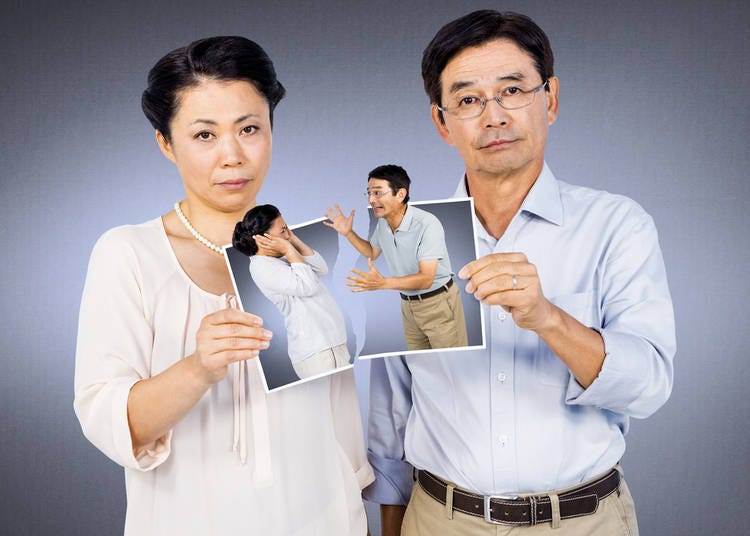Think Again Dumbass Cause Now Im Pissed

How To Go Mad in Japanese: 30 Angry Japanese Phrases for When You lot Just Can't Take it!
Date published: 6 Dec 2019
Last updated: 29 September 2020
Japanese people are often described as very polite and reserved. In fact, many of them don't evidence an expressive personality in public and rather continue their feelings within than spitting it all out.
But that doesn't mean there are no words to express your emotions!
In this commodity, we'll accept a look at rude Japanese phrases for those times you lot simply want to tell someone off.
- Table of Contents
-
- How older people go mad in Japanese
- How adults get angry in Japanese
- Angry Japanese phrases younger people/teenager tend to use
- Petulant or angry phrases Japanese kids use
- ...And the most powerful Japanese expression of all!
How older people get mad in Japanese

one. "Hara ga tatsu."= I'm irritated. / I'grand angry.
This is one of the about mutual phrases that is used to depict general anger. Information technology can range from being irritated to admittedly pissed off depending on how you say it.
・Example: Ughh, hara ga tatsu! He's parking the car in front of our place again!
2. "Ikari shinto ni hassuru."/"Ikari shinto."= I am completely mad.
"Ikari shinto ni hasshita." = I was completely mad.
This phrase is kind of an idiom. Although it means you are unbelievably angry, it is non usually used at the time when you exploded but used when you describe how upset you were.
・Example: And then, she snorted at me! At that time, ikarhi shinto ni hasshita.
3. "Atama ni kuru." = I'yard losing my atmosphere.
"Atama ni kita." = I lost my temper.
This phrase is used when you express your anger to yourself or somebody else who is not the ane who provoked you.
・Example: Ahhh, atama ni kuru. My colleague but left his task on my desk-bound and has gone habitation while I was in a meeting. He always does this.
These three phrases above all incorporate the words of torso parts such every bit 'hara' (stomach), 'shinto' (eye), and 'atama' (caput). In fact, Japanese idioms ofttimes use a part of the torso.
four. "Ii kagen ni shiro!" (Male phrase) = Give me a interruption! / That is enough (so stop information technology)!
"Ii kagen ni shite!" (Female phrase) = Give me a interruption, delight! / That is enough (and so delight finish information technology)!
・Example: Ii kagen ni shiro! It's already after the mid-night, kids! Close up and go to bed!
5. "Yamero!" (Male phrase) = Finish it!
"Yamete!" (Female phrase) = Stop it, please!
"Oyame nasai!" (Very formal, polite phrase but also implies an lodge) = Would you terminate it, darling, correct now.
"Yame nasai!" (Less formal, but even so polite, also implies an order. Usually used when a speaker is in a higher position than the one who is told. For case, a boss to an employee, a parent to their kid, or an owner to their pet) = Stop it!
・Example: Yamete! I said I don't want to heed to a ghost story! Don't you cartel offset.
*Don't stop in Japanese would be "Yamenaide."
6. "Omae no sei daro!" (Male phrase) = It is your fault! = It must be your error!
"Anata no sei desho!" (Female phrase) = It is your error! = It is your fault, isn't it?
In current Japan, 'omae' is a very rude way to phone call somebody, so many Japanese get a like impression as when English speakers are called like 'oi, you!' Whereas 'anata' is a very formal and polite give-and-take which also means 'y'all', that would exist 'sir/madam', or 'darling' when it's said with a friendly tone, in English.
In that location is also another departure betwixt these two phrases if you lot meet the stop of each phrase. 'Daro' here is quite judging while 'desho' hither is more than like asking. This gap makes the actual meanings of these phrases significantly different even though their definitions seem the same.
In Japanese, it used to be believed that women must use 'female linguistic communication' which e'er contains the meaning of 'delight'. As you see in the phrases shown higher up, they more often than not share the words except for the very terminal sound of the sentences. In many cases, 'te' at the finish of a sentence makes it into a more than pleading phrase.
Many older ladies nonetheless speak this different language, while younger ones tend not to follow this old hat lingo.
vii. "Mattaku." = Damn it. / Oh well. / etc.
This phrase shows a slight irritation, especially when yous give up fighting against something that annoys you.
・Example: Mattaku... How many times should I tell my colleague that she'due south taking the incorrect procedure? I'yard fed up with covering her...
8. "Baka baka shii." = Nonsense. / Bollocks. / Stupid. / etc.
This phrase shows irritation and a slight antipathy.
・Example: Baka baka shii. What kind of myth does that politician believe? All he speaks is nonsense.
How adults get angry in Japanese

9. "Chikusho!" = Damn! / Damn it!
This phrase comes from Buddhism. Chikusho means animals, sometimes specifically domestic animals, or beast/brute. In Buddhism, the animal doesn't include human-beings, and it is believed that information technology states inferiority to humans. Stemming from this, the Japanese used to call a person who does what is not acceptable equally a human 'chikusho'.
Dissimilar the English word "damn!", this Japanese discussion is not so commonly used by younger people today as it sounds a bit besides dramatic to say in the real globe. Still, some older ones still say it when they are irritated.
・Case: Chikusho! We were ripped off!
ten. "Huzakeruna." = Stop fooling around. / Come up on. / What the hell? / etc.
"Huzakenaide." (Female phrase. Nearly the same significant but this one has a pleading tone.)
The literal meaning of this phrase is 'stop fooling around.' Only it tin can also describe your irritation or unpleasant surprise such as 'come on!' or 'what the hell?'
Again, at that place is a female person version. In younger generations, women mostly don't speak the female language as much equally older people practise, merely some specific phrases are still used.
・Instance: Huzakeruna! You lot said everything on the card was 500 yen! I'm not gonna pay ten,000 yen just for iii spectacles of beer and sashimi. This is a scam!
・Example 2: Huzakenaide! You must've been told nosotros'd charge you lot for service and the venue fee. This is non a scam!
xi. "Kanben shite." "Kanben shitekure." = For goodness' sake!
This phrase does not always illustrate anger as it originally means 'Delight, stop it now for me. I've had/done/tried enough.' So, y'all might hear it at a marketplace, for example, a friendly seller might say it to a customer who is haggling also much.
・Example: Kanben shitekure. We've waited for 2 hours, and you say nosotros were in the wrong queue? Accept mercy, delight!
12. "Iraira suru." "Iratsuku."= I'one thousand irritated.
'Iraira' describes the statement of being irritated. So, you tin can also use this phrase like 'iraira shiteru ne.' = You are irritated (aren't you)? when you worry near somebody who seems quite upset.
・Example:Ughh, iraira suru! The auto earlier united states is too tedious!
13. "Nametenja ne zo." "Namen na./Nameru na."= Don't mess with me. / Don't take me for granted.
This phrase is to use when you are treated badly. Information technology may scare people depending on the tone of voice, so you should exist careful when using it.
Yet, the literal meaning of 'nameru na' is 'don't lick.' Then, you may also hear, for example, a parent says to their kid 'Nameru na.' or 'Namenai de.'(softer version) to stop them licking something dirty, for example.
・Instance: You think I can do nothing? Namen na. You'll come across.
fourteen. "Yurusanai." = I'm not gonna forgive (you/her/ him/etc.).
"Yurusenai." = I can't forgive (you/her/him/etc.).
・Example: She cheated on me. Yurusenai!
15. "Nandayo!" = Encarmine hell!
16. "Damare." = Close upwardly.
17. "Kiero." = Piss off.
18. "Kuso!" = Sh*t! / F*ck!
・Example:
A: Nandayo! You lot pushed me commencement!
B: Damare. It was an blow, but and then you kicked me on purpose. I tin call the constabulary if you like.
A: Kuso! You'll regret this!
B: Kiero.
nineteen. "Oi! "= Oi!
It's pronounced nearly the same every bit the English version, but if the Japanese cry out "oi!", it means he/she is furious. (Or, in some cases, they are not angry but just extremely rude.)
・Instance: Oi! Are you listening to me? I said y'all scratched my car!
xx. "Hai hai." = Yes, aye. / Okay, okay.
In Japan, proverb aye twice is often considered rude behavior. In fact, many parents tell their kids off for it. So, when the Japanese dare speaks like this, information technology 99% surely ways that they are quite annoyed and want to let some other person realize it, or might be even trying to provoke them. Imagine how you'd experience if somebody says "I know, I know." earlier you stop. It is a similar situation to how the Japanese feel when somebody says "Hai hai."
・Example:
A: Are you listening to me? I'1000 proverb I asked you 2 hours ago to do the dishes, and y'all are still sitting on a sofa, watching the DVD! How dare you!
B: Hai hai. By the way, do you know who's doing all the housework every day?
Aroused Japanese phrases younger people/teenager tend to utilise

Younger Japanese are oft called "satori generation" (Satori=Enlightenment), which means they are realistic, likely to aim at only an attainable goal, and having little eagerness. Information technology besides caused them to exist hesitant or even tend to avoid clashing with others. Hence, the angry words they use are oftentimes less aggressive compared to the other generations.
Also, every bit many of them are enlightened of unfairness between male language and female language, they tend not to use it themselves, and not to expect others to use it also.
21. "Mukatsuku." = I'k angry. / I don't like it. / etc.
Mukatsuku originally indicates the condition of your belly beingness funny like after yous overate oily food. So, you can also apply this phrase when you feel a bit sick to your stomach, 'I ga mukatsuku.' (i = tummy)
And, because when information technology can also happen when yous are upset, this phrase is used to limited anger too.
・Example: Mukatsuku! He saw me tripped, and laughed!
22. "Uzai" = It's annoying. / I'm annoyed.
This is kind of slang, which the original word was "Uzattai."
Uzai, uzattai both are used when something (often persistently) annoys you.
・Example: Ahhh, uzai! Stop following me. I said I wouldn't leave with y'all!
23. "Doh demo ii." = Whatsoever. / I don't intendance.
24. "Suki ni sure ba?" = Why don't you comport as y'all like?
25. "Moh ii." = I had plenty. / I don't expect anything from yous anymore.
These phrases testify that a speaker no longer has any interest in others considering they are offended/angry/fed up/ etc. In Nippon, many people think indifference is worth than detest. Hence, you might be in a serious state of affairs when you hear these phrases.
26. "Ha?" = What the hell?
This sounds often indicates a slight irritation or unpleasant surprise. (And some younger people also use it when they are overwhelmed considering something too good happens.)
Unlike the English language phrase 'what the hell?' or any related variation, this is often considered equally a rude, cheeky phrase by older people. Hence, I recommend you to consider it well earlier y'all try the word.
27. "Shine." = Die.
Younger people often use this word as a similar nuance of 'f*ck!' in English, to bear witness their anger/irritation. Then, although the literal meaning of this phrase is 'die' or 'you die', it can be said to objects too.
Note: As yous meet its meaning, this is non a very skilful word. I propose, if you feel like to try it, to just use it inside friends or family, and not to humans/animals.
・Instance: So, hither's nonetheless some other error! You, useless reckoner, polish!
Petulant or angry phrases Japanese kids use

28. "Moh!" = Ughh!
This shows a frustrating feeling when a thing doesn't go as you await. Grown-ups likewise use it when they are alone or with their friends/family.
・Example 1: Kid: Moh! My sister broke my sandcastle!
・Case ii: Adult: Moh! This laptop has a listen of its own!
29. "Ya!" "Yada!" = No! / I don't want (to do) it! / I hate it! / etc.
Kids use these phrases when they don't like/like to practise something, for example, when they are forced to eat what they dislike or when they are told to put toys away. 'Yada' can likewise be used by adults.
・Example 1: Child: Ya! I don't go abode withal! I wanna play more!
・Example 2: Kid: Yada! Yada! Yada! I hate carrot! I don't wanna consume it!
・Instance 3: Adult: What? Yada. I'm non gonna fetch a beer for you, dad. I'm watching TV.
...And the almost powerful Japanese expression of all!

Now you know 29 typical expressions of anger in Japanese! Y'all'll definitely hear them on Tv set, or you might even take a chance to catch some in public during your stay.
And, here is the virtually common one across all generations, that is to say, 'silence.'
After all, most Japanese people remain tranquillity when they are completely furious, letting the absence of audio speak louder than any shout could. Information technology might be because they lose for words when they are agitated as they are non used to expressing their feelings but to holding information technology. Or, it might be because they feel it's embarrassing to spit out how they're offended by others. (You might have an feel where a Japanese person asked, 'Are you angry?' when you were just repose. Well, this is the reason why they asked.)
Written past:

*This information is from the time of this article'due south publication.
*Prices and options mentioned are subject to alter.
*Unless stated otherwise, all prices include tax.
-

Annual Survey Reveals Near Attractive Prefectures in Japan
-

90-Min, 100-Particular Banquet?! We Endeavour Toyama Sushi Ginza's All-yous-can-eat Sushi in Tokyo's Swanky Neighborhood (Report)
-

2022 Ramen Trends in Japan - According to a Ramen Main
-

Premium Chocolate Make Lindt Japan Launches World's Get-go Sakura LINDOR In Time For Spring 2022!
- #best sushi nihon
- #what to do in odaiba
- #what to bring to nippon
- #new years in tokyo
- #best ramen japan
- #what to buy in ameyoko
- #japanese nail trends
- #things to do japan
- #onsen tattoo friendly tokyo
- #daiso
- #best java japan
- #best japanese soft drinks
- #best yakiniku japan
- #japanese fashion culture
- #japanese convenience store snacks
Source: https://livejapan.com/en/article-a0003527/
0 Response to "Think Again Dumbass Cause Now Im Pissed"
Post a Comment